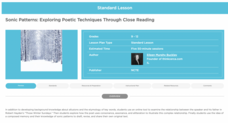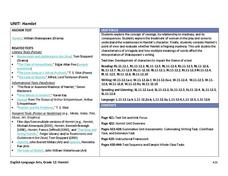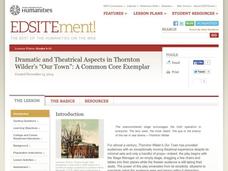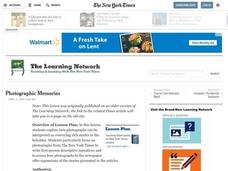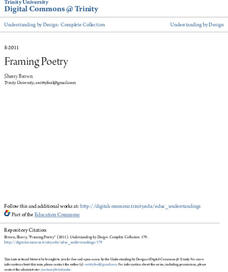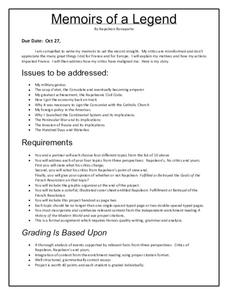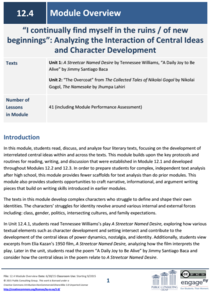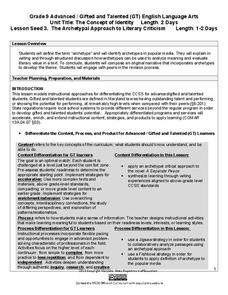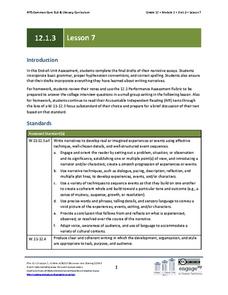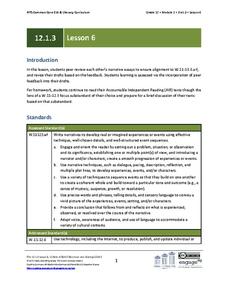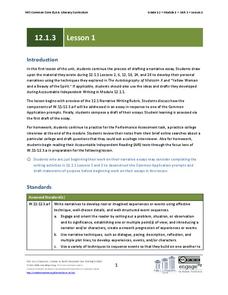ReadWriteThink
Sonic Patterns: Exploring Poetic Techniques Through Close Reading
Robert Hayden's poem "Those Winter Sundays" serves as the anchor text in a five-part lesson that takes the mystery out of poetry analysis by modeling explicit strategies for pupils to employ to conduct a close reading of a poem. After...
Louisiana Department of Education
Unit: Hamlet
Encourage readers to determine if Hamlet's madness is actually divinest sense. Class members analyze the words of the play before studying related texts, including T.S. Eliot's "The Love Song of J. Alfred Prufrock," scenes from...
Dream of a Nation
Writing a Narrative Essay
Imagine using narrative essays to encourage change. This multi-week unit plan does just that. After reading a series of articles from Tyson Miller's Dream of a Nation: Inspiring Ideas for a Better America, class members examine the...
National Endowment for the Humanities
Dramatic and Theatrical Aspects in Thornton Wilder’s “Our Town”: A Common Core Exemplar
“So I’m going to have a copy of this play put in the cornerstone and the people a thousand years from now’ll know a few simple facts about us.” Our Town is used as the text in a Common Core exemplar that examines the dramatic and...
Curated OER
Photographic Memories
Explore how photographs can represent a whole story to a viewer. Middle schoolers work on narrative writing techniques in this lesson, focusing on photographs from the New York Times to write first-person descriptive narratives....
K20 LEARN
The War of the Words: Grammar and Parts of Speech
Here's a lesson that adds some zip to a study of parts of speech. Class members read two versions of the same article, one loaded with evocative nouns, verbs, adjectives, and adverbs, while the other is missing this sensory language....
K20 LEARN
Diggin' Deeper - Poetry Made Relevant: Poetry And Poetic Devices
What do Beethoven, Bob Dylan, and Pharrell all have in common? Works by these three musicians are used to launch a study of poetry. Class members listen to passages from the music and craft a quick write about how the music makes them...
Trinity University
Framing Poetry
The big idea in this poetry unit plan is that structure and content work together to create meaning. Class members learn how to identify and mark the metrical patterns and line lengths used in poems. They study the structure of various...
Children’s Hospital of Philadelphia
Case Study: The 1918 Influenza Pandemic – Factors Beyond the Biological that Influence the Spread of Disease
A very timely lesson looks at the social and political factors that affect the spread of disease. Using the 1918 Influenza Pandemic as a case study, pupils research factors that influenced the spread of the disease, including the role of...
Thoughtful Learning
Adjusting Your Writing Voice
"Yo, what's up?" "Nuttin!" While such a dialogue might be appropriate between friends, it would be ill-advised in more formal situations. A mini-lesson asks young writers to consider how to adjust the voice they use to bring their...
PBS
The Power of Personal Narrative
Personal narratives are powerful things. Whether told from the first-person or third-person point of view, whether in the form of an essay, a short story, novel, or video, whether fiction or fact, they capture readers and give them...
Beverly Hills High School
Memoirs of a Legend
To conclude a study of the French Revolution, young historians adopt the voice of critics of Napoleon Bonaparte and lay charges against him. They then craft a memoir in Napoleon's voice that details his motives and what he sees as his...
The New York Times
Literary Pilgrimages: Exploring the Role of Place in Writers’ Lives and Work
Do the places you have lived influence what you write? Class members research the lives of writers and look for how places these writers have lived might have influenced their writings.
NPR
Chinese American Women Lesson Plan
The National Women's History Museum provides a plan designed to accompany their online CyberExhibit, Chinese American Women; a History of Resilience and Resistance. After examining a series of primary and secondary source documents,...
EngageNY
Grade 12 ELA Module 4: Literary Analysis
Does identity come from within, or do external forces shape it? Explore the complex identity concept with a two-unit module for 12th-grade language arts. The first unit uses A Streetcar Named Desire by Tennessee Williams and "A Daily Joy...
Maryland Department of Education
The Concept of Identity Lesson 3: The Archetypal Approach to Literary Criticism
As class members continue their study of approaches to literary criticism, readers examine the symbolism and archetypal patterns in John Knowles' A Separate Peace, and how these parallels are used to develop a theme...
EngageNY
Grade 11 ELA Module 4 Overview
The intricate craft of narrative writing can make a happy story feel exuberant or a sad story feel devastating. With 42 extensive lessons that include poignant discussion questions, standards-aligned self-reflections, engaging writing...
EngageNY
Grade 12 ELA Module 1, Unit 3, Lesson 7
As an end-of-unit assessment, class members complete the final drafts of their Common Application narrative essay and then meet in pairs to discuss the independent reading selection.
EngageNY
Grade 12 ELA Module 1, Unit 3, Lesson 6
After a brief discussion of their independent reading texts, pairs exchange their college narratives and, using the provided peer review tool, give their partner suggestions on how the draft may be improved.
EngageNY
Grade 12 ELA Module 1, Unit 3, Lesson 5
To underscore the importance of precise diction and sensory details in narratives, class members examine two statements to determine which is more effective and significantly impacts the reader. Individuals then examine their college...
EngageNY
Grade 12 ELA Module 1, Unit 3, Lesson 1
In this first activity of the unit, class members continue to work on their draft of a narrative essay response to a prompt found on the college Common Application.
EngageNY
Grade 12 ELA Module 1, Unit 2, Lesson 4
The fourth instructional activity in this narrative writing unit focuses on how Leslie Marmon Silko uses telling details and sensory language in her "Yellow Woman and a Beauty of the Spirit" to bring alive the people of Laguna Pueblo and...
EngageNY
Grade 12 ELA Module 1: Unit 1, Lesson 24
Today's discussion of The Autobiography of Malcolm X focuses on the precise words, the telling phrases, and the sensory details Haley uses to enliven his story. Writers then work to incorporate these same techniques in the draft of their...
EngageNY
Grade 12 ELA Module 1: Unit 1, Lesson 23
Malcolm X's journey to Cairo, his Hajj, his Letter from Mecca detailing his insights into "true Islam," and his transition to Al-Hajj Malik El-Shabazz are the focus of the discussion of chapter 17 of The Autobiography of Malcolm X.


